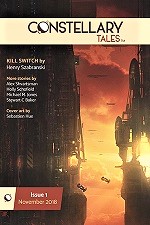 Constellary Tales #1, November 2018
Constellary Tales #1, November 2018
“Kill Switch” by Henry Szabranski
Reviewed by Robert L Turner III
Since this is a new journal, I will include a brief description of the journal itself and conclude with my general impressions.
One of the first thing that you notice when you land on the Constellary page is the cover work of the issue. It comes from Sebastien Hue and is strikingly well done. The length of the stories is short: a max of 3,500 words and the selected pieces aim for the intersection of science/magic and humanity. The payrate is 6 cents per word, making this a professional paying market by SFWA standards, and the schedule as of now is quarterly. In addition to the stories, there is a monthly podcast that discusses writing, stories, and SF related subjects. On to the stories themselves.
The first entry, “Kill Switch” by Henry Szabranski is an interesting piece in which a cyborg drone, sent on a suicide mission against a rebel drone, comes to self-awareness and must choose his own path. Although stories about the melding of mind and machine and the dangers and possibilities of the combination are not new, Szarnaski does an admirable job of concisely touching upon a number of potential problems and in the end leaves the reader slightly in the dark as to what has actually happened. In other stories this might be a defect, but here the author maintains the balance of knowledge/doubt well. While it doesn’t tread any new ground, it is a solid and well written piece that will especially appeal to those interested in the melding of mind and computer code.
Alex Shvartsman presents a fascinating world in which a sufferer of advanced ALS enters other’s dreams in order to overcome nightmares. “Such Stuff as Dreams Are Made On” explores what happens when he meets another dream walker. In this story, the key unifying element is the weapon that each nightmare contains. Each nightmare contains the means to undo it, and the narrator discovers that perhaps he and Stephanie, the other dream walker, are each other’s weapon. This is a good piece with an interesting world and strong development. What it lacks to be a great story is a little more subtlety in the creation of the overall metaphor. This is a nice addition to this initial issue.
“Reaching Up, Reaching Back” by Holly Schofield is an old school time travel piece with the narrator jumping back to the past to fix a timeline gone wrong. In this iteration, the narrator tries to save an abused woman named Amanda from a murder conviction after she shoots her boyfriend. The story is about what one would expect for the genre and contains no unexpected twists or turns. The twist: the familial connection between the time traveler and Amanda breaks no new ground, but the story is pleasant to read and reaches a minimal level of pathos. Overall, the story is solid.
Michael M. Jones literalizes the spirit of Bourbon Street and Mardi Gras in “The Tears of Bourbon Street.” Gideon, a man with power over the dead, chained to his lover-ghost, must stop an unintended invasion of Ghosts at the height of Fat Tuesday. Jones’ imagery is interesting, the story itself flows well. It has a bit of a Simon R. Green feel to it, with hints at a larger story that remains in the shadows. As in the previous entry, there is an element of Pathos involved, but it is not well enough developed to be truly impactful. Jones creates an interesting world and leaves enough elements to explore to merit a return to it.
“Memorial Park” by Stewart C Baker starts with the death of a child. After the death of her daughter Julie, Cordelia decides to buy an animal construct imprinted with her daughter’s memories as a means of dealing with her grief and guilt. The story closes as she sees the result of her choice and shares a moment with the animal. Baker’s story is very short (950 words) and works decently as a micro-story, but doesn’t really connect. The writing is very strong and the imagery is good, I just don’t feel like there is enough of an impact to make the piece work at a higher level.
Looking at the issue as a whole, I think Constellary Tales has to feel good about this initial foray. While none of the choices are stellar, all are solid stories and none disappoint. Listening to the podcast was interesting and while I am not a podcast type person, I think those who like them will enjoy the dynamic and commentary between the two brothers. I am optimistic about the quality and content of this magazine and hope to see them continue from what I consider a very solid start.
Robert Turner is a professor and long term SF reader.